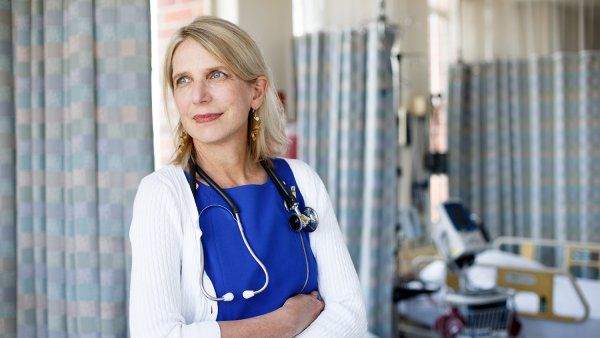University of California San Francisco
-
-
The Female Face of HIV: "We Don't Have to Care for Ourselves"
-
Chicago Woman's Family Lawyers Up After Abortion-Related Death
-
Does Palliative Care Belong in the ER?
-
SEARCH Study Shows 1-Year Drop in HIV Virus Levels in Rural Ugandan Parish After Community Health Campaign
Population-wide levels of HIV virus dropped substantially between 2011 and May 2012 in a rural part of southwestern Uganda, the site of two community health campaigns led by doctors at the University of California, San Francisco (UCSF), San Francisco General Hospital and Trauma Center (SFGH) and Makerere University in Kampala, Uganda.

-
Child's Illness Fuels Search for Early-life Epilepsy Diagnostics
<p>When Ramon Birnbaum, <abbr title="Doctor of Philosophy">PhD</abbr>, came to <abbr title="University of California, San Francisco">UCSF</abbr> three years ago to do his postdoctoral work on the role of genetic regulation in human disease in the lab of School of Pharmacy faculty member Nadav Ahituv, <abbr title="Doctor of Philosophy">PhD</abbr>, epilepsy was barely on his radar.</p>

-
AIDS 2012 Draws Thousands to Nation's Capitol
<p><span>Bill and Hillary Clinton, Sharon Stone, Kathleen Sebelius, Bill Gates and Elton John are a few of the headliners to speak this week at AIDS 2012, the XIX International AIDS Conference, which runs through July 27 in Washington, D.C.</span></p>

-
Kids' Cholesterol Tests: Doctors At Odds Over Test Guidance
-
Doctors Dispute Cholesterol Testing for Kids
-
Warner Greene Authors HIV/AIDS Medicine Textbook for Developing World
Warner C. Greene, MD, a professor of medicine, microbiology and immunology at UCSFwho directs virology and immunology research at the UCSF-affiliated Gladstone Institutes, has joined with other global AIDS experts to release a locally affordable version of the world’s leading AIDS medical textbook.

-
Health Campaign Shows Universal HIV Testing Can Be Extended for Early Identification of Other Diseases
A clinical study in a remote region of southwest Uganda has demonstrated the feasibility of using a health campaign to rapidly test a community for HIV and simultaneously offer prevention and diagnosis for a variety of other diseases in rural and resource-poor settings of sub-Saharan Africa.

-
New Treatment Could Zap Skin from Cancer
-
UCSF/SFGH Researchers Call for Change in New FDA Recommendation on HIV and TB Drug Doses
In January 2012, the U.S. Food and Drug Administration (FDA) issued new guidelines on dosing of an HIV medication used to treat people infected with both HIV and tuberculosis (TB) because of a potential interaction between two of the main drugs used to treat each disease.

-
Should All U.S. Children Get a Cholesterol Blood Test?
-
Scientists Make Curing HIV a Priority
-
Elderly Drinking May Up Dementia Risk
-
New Lipid Screening Guidelines for Children Overly Aggressive, UCSF Researchers Say
Recent guidelines recommending cholesterol tests for children fail to weigh health benefits against potential harms and costs, according to a new commentary authored by three physician-researchers at UCSF.

-
Begin HIV Treatment Sooner, Not Later, Experts Say
-
For Elderly, Poor Sleep Linked With Placement In Nursing Home
-
HIV Specialists, Advocates Urge International Action at "Turning Point" in AIDS Fight
-
Cravings Could Be Defeated with Two Little Words
-
Vanity Fair Nominates: Dr. Diane Havlir
-
Hair Samples from Infants Show Exposure to Anti-HIV Drugs in the Womb and During Breast-feeding
Researchers from the University of California, San Francisco (UCSF) and Makerere University in Uganda have used hair and blood samples from three-month old infants born to HIV-positive mothers to measure the uninfected babies’ exposure — both in the womb and from breast-feeding — to antiretroviral medications their mothers were taking. The results, they said, are surprising.

-
Experts Outline Steps Towards an AIDS-free Generation
<p>A perspective published in the <em>New England Journal of Medicine</em> this week by professors at UCSF and the Johns Hopkins University asserts that it is now possible to begin to end the AIDS epidemic by widely and strategically applying existing tools.</p>

-
Cancer Support Community's New Service
-
AIDS Conference Returns to U.S. For First Time Since 1990
-
UC San Francisco to Form Advisory Board for 'Challenging Times'
-
Scientists Dare to Use the C-Word -- Cure -- As AIDS Meeting Sets to Open in Washington
-
AIDS 2012 Conference Co-Chair Diane Havlir Talks About What it Takes to Turn Tide on Disease

-
AIDS Summit Returns to US After 22 Years
